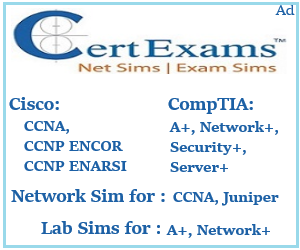try
{
//Protected code
}
catch (ExceptionName e1)
{
//Catch block
}
An exception causes a jump to the end of try block. If the
exception occurred in a method called from a try block, the
called method is abandoned. If there's a catch block for the
occurred exception or a parent class of the exception, the exception
is now considered handled. At least one 'catch' block or one
'finally' block must accompany a 'try' statement. If all 3 blocks
are present, the order is important. (try/catch/finally) finally
and catch can come only with try, they cannot appear on their
own.
Regardless of whether or not an exception occurred or whether
or not it was handled, if there is a finally block, it'll be
executed always. (Even if there is a return statement in try
block).
If there was no exception or the exception was handled, execution
continues at the statement after the try/catch/finally blocks.
f. Java Keywords
Java keywords are also known as reserved words. Keywords are particular words that act as a key to a code. These are predefined words by Java so they cannot be used as a variable or object name or class name.
List of Java Keywords
abstract: Java abstract keyword is used to declare an abstract class. An abstract class can provide the implementation of the interface. It can have abstract and non-abstract methods.
boolean: Java boolean keyword is used to declare a variable as a boolean type. It can hold True and False values only.
break: Java break keyword is used to break the loop or switch statement. It breaks the current flow of the program at specified conditions.
byte: Java byte keyword is used to declare a variable that can hold 8-bit data values.
case: Java case keyword is used with the switch statements to mark blocks of text.
catch: Java catch keyword is used to catch the exceptions generated by try statements. It must be used after the try block only.
char: Java char keyword is used to declare a variable that can hold unsigned 16-bit Unicode characters
class: Java class keyword is used to declare a class.
continue: Java continue keyword is used to continue the loop. It continues the current flow of the program and skips the remaining code at the specified condition.
default: Java default keyword is used to specify the default block of code in a switch statement.
do: Java do keyword is used in the control statement to declare a loop. It can iterate a part of the program several times.
double: Java double keyword is used to declare a variable that can hold 64-bit floating-point number.
else: Java else keyword is used to indicate the alternative branches in an if statement.
enum: Java enum keyword is used to define a fixed set of constants. Enum constructors are always private or default.
extends: Java extends keyword is used to indicate that a class is derived from another class or interface.
final: Java final keyword is used to indicate that a variable holds a constant value. It is used with a variable. It is used to restrict the user from updating the value of the variable.
finally: Java finally keyword indicates a block of code in a try-catch structure. This block is always executed whether an exception is handled or not.
float: Java float keyword is used to declare a variable that can hold a 32-bit floating-point number.
for:Java for keyword is used to start a for loop. It is used to execute a set of instructions/functions repeatedly when some condition becomes true. If the number of iteration is fixed, it is recommended to use for loop.
if: Java if keyword tests the condition. It executes the if block if the condition is true.
implements: Java implements keyword is used to implement an interface.
import: Java import keyword makes classes and interfaces available and accessible to the current source code.
instanceof: Java instanceof keyword is used to test whether the object is an instance of the specified class or implements an interface.
int: Java int keyword is used to declare a variable that can hold a 32-bit signed integer.
interface: Java interface keyword is used to declare an interface. It can have only abstract methods.
long: Java long keyword is used to declare a variable that can hold a 64-bit integer.
native: Java native keyword is used to specify that a method is implemented in native code using JNI (Java Native Interface).
new: Java new keyword is used to create new objects.
null: Java null keyword is used to indicate that a reference does not refer to anything. It removes the garbage value.
package: Java package keyword is used to declare a Java package that includes the classes.
private: Java private keyword is an access modifier. It is used to indicate that a method or variable may be accessed only in the class in which it is declared.
protected: Java protected keyword is an access modifier. It can be accessible within the package and outside the package but through inheritance only. It can't be applied with the class.
public: Java public keyword is an access modifier. It is used to indicate that an item is accessible anywhere. It has the widest scope among all other modifiers.
return: Java return keyword is used to return from a method when its execution is complete.
short: Java short keyword is used to declare a variable that can hold a 16-bit integer.
static: Java static keyword is used to indicate that a variable or method is a class method. The static keyword in Java is mainly used for memory management.
strictfp: Java strictfp is used to restrict the floating-point calculations to ensure portability.
super: Java super keyword is a reference variable that is used to refer to parent class objects. It can be used to invoke the immediate parent class method.
switch: The Java switch keyword contains a switch statement that executes code based on test value. The switch statement tests the equality of a variable against multiple values.
synchronized: Java synchronized keyword is used to specify the critical sections or methods in multithreaded code.
this: Java this keyword can be used to refer the current object in a method or constructor.
throw: The Java throw keyword is used to explicitly throw an exception. The throw keyword is mainly used to throw custom exceptions. It is followed by an instance.
throws: The Java throws keyword is used to declare an exception. Checked exceptions can be propagated with throws.
transient: Java transient keyword is used in serialization. If you define any data member as transient, it will not be serialized.
try: Java try keyword is used to start a block of code that will be tested for exceptions. The try block must be followed by either catch or finally block.
void: Java void keyword is used to specify that a method does not have a return value.
volatile: Java volatile keyword is used to indicate that a variable may change asynchronously.
while: Java while keyword is used to start a while loop. This loop iterates a part of the program several times. If the number of iteration is not fixed, it is recommended to use the while loop.
3. Object oriented Concepts
a. Classes and objects
- Classes: A class is a structure that defines data and
functions to operate/modify/work on that data.
- Objects :Object is a feature of a class, which is used
for working on the particular properties of the class. A
class can have any number of objects in memory at one time
b. Scope
- Names are used to access methods and variables.
- Different namespaces are used in java some of them are
given below:
- Package names
- Type names
- Variable names
- Method names
- Local variable names (including parameters)
- Labels
- Each declared Enums has its own namespace.
- The scope of a name is the part of a class in which
it can be seen.
Variable scope
|
Owner |
Declared in |
Life span |
Can be used |
| Local variable |
Method where declaration is done |
Inside method |
Till method executes |
Only inside method where declaration is done |
| Instance |
Each object has a copy |
Inside a method, outside a class without static |
As long as object exists |
In all instance methods of the class |
| Class |
Class where declaration is done |
Inside a method, outside a class with static |
As long as containing class is loaded |
In all methods of class |
Method scope
- The scope of a method declared anywhere in a class is
the entire class.
- The scope of a method's formal parameters is the entire
method.






